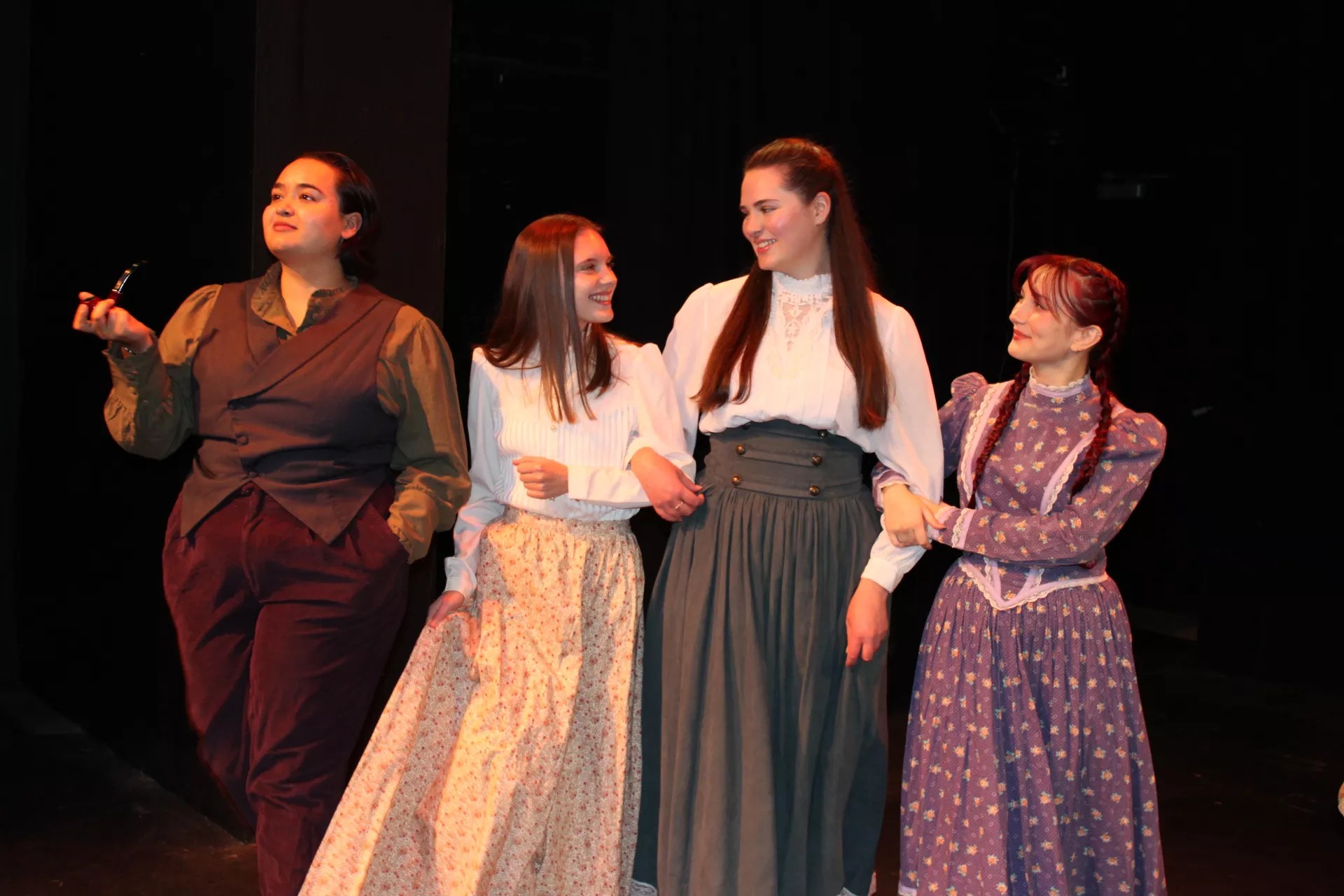
Courtesy of Toni Tresca

Audio By Carbonatix
In a deeply polarized America following Donald Trump’s reelection, Firehouse Theater Company‘s production of Little Women arrives with resonant themes that strike at the heart of the nation’s current status. Kate Hamill‘s adaptation of Louisa May Alcott’s novel, directed by Kate Poling, embraces the March sisters’ story with new urgency.
“After the election, there are definitely things that feel different in the play,” Poling says. “We haven’t actually sat down and talked about it – mostly for time reasons, because that would probably be an entire rehearsal’s worth of just talking through it. But our country is so divided right now. Even though I’m not directing it to be about the election, you’re going to see elements of it in the script.”
The adaptation’s feminist sensibilities, exploration of gender roles and commitment to authentic, imperfect womanhood carry extra weight. Poling cites one of Jo March’s opening lines as a particularly poignant example of the play’s newfound gravity: “Once upon a time, there was a family. And this family lived in a small house in the shadows of a big city. And outside the city was an even bigger country, and that country went to war with itself.”
Against the backdrop of national division, the struggles of the March sisters to carve out their identities feel strikingly contemporary.

Little Women follows the lives of the four March sisters — Jo, Meg, Beth and Amy — as they come of age during the Civil War.
Courtesy of Toni Tresca
“There’s something to be said for doing Little Women in a time when there is so much turmoil existing in the world, especially existing around people’s right to exist as themselves with the election that has just happened,” says Claylish Coldiron, who plays Jo. “There is so much uncertainty about people’s rights to live or have any rights at all, so watching a show about a girl who is just trying to learn to exist in the world and figure out who she is is very cathartic.”
Little Women, a beloved novel written by Alcott in 1868, follows the lives of the four March sisters – Jo, Meg, Beth and Amy – as they come of age during the Civil War. Hamill, known for her feminist reimaginings of literary classics such as Dracula and Emma, brings a contemporary lens to this familiar tale. Her adaptation preserves the essence of Alcott’s work while infusing it with new humor and a critical look at gender norms.
Poling, who admits to having been obsessed with Little Women as a child, recalls her excitement when she read Hamill’s script. “I love her work, so reading the script and seeing what she had done with the story was great,” she says. “All of my memories of it came flooding back, and I loved how the script had the quintessential Kate Hamill zaniness and chaos that you see in her shows.”
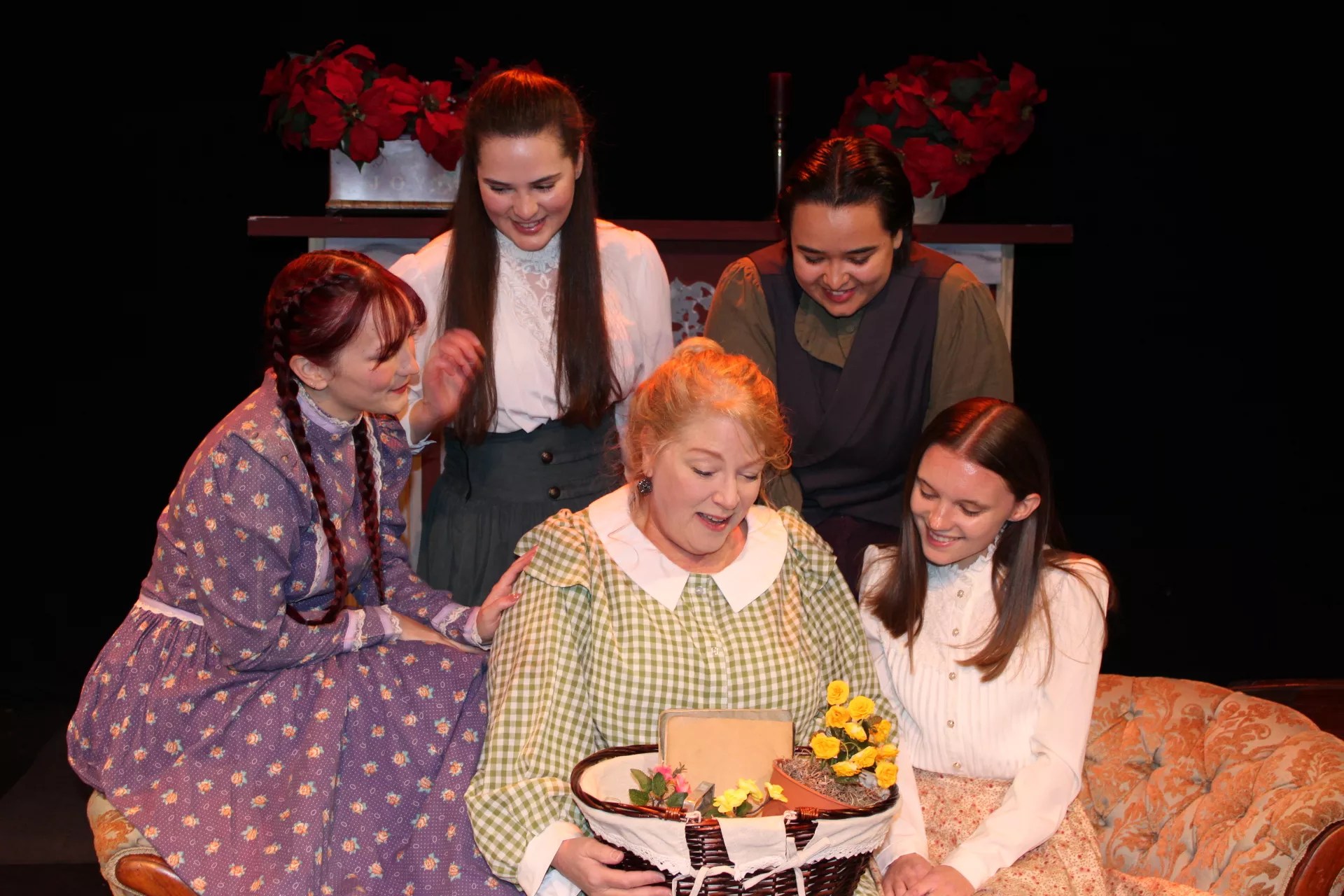
Kate Hamill’s adaptation deepens the characters’ complexities, giving each sister a distinct voice and contemporary resonance.
Courtesy of Toni Tresca
Hamill’s adaptation deepens the characters’ complexities, giving each sister her own voice and modern resonance. This is what persuaded Firehouse Executive Producer Helen Hand, who says that the book was “formative” for her, to produce the play.
“Somebody suggested that we do Little Women while we were reading plays, and at first I wasn’t sure, because every theater company does Little Women, especially during the holidays,” Hand says. “But then when we read Kate Hamill’s adaptation – this version just pops differently. It retains much of the original novel’s lovingness, kindness and humor, but it’s presented in a more modern, interesting way.”
Hamill’s Little Women remains centered on Jo, the headstrong, ambitious, second-oldest sister who refuses to conform to traditional gender roles. Coldiron’s portrayal of Jo is a vivid representation of defiance and a desire to change the world.
“Jo is the rebel and dissenter,” Coldiron says. “She’s the one who doesn’t feel like she fits in, and I’ve always kind of felt that way. I felt so connected to the book when I was younger, and then going through my own journey with queerness – not just with sexuality, but also around gender queerness – and relating it to Little Women has been a really cool second coming of the story for me.”
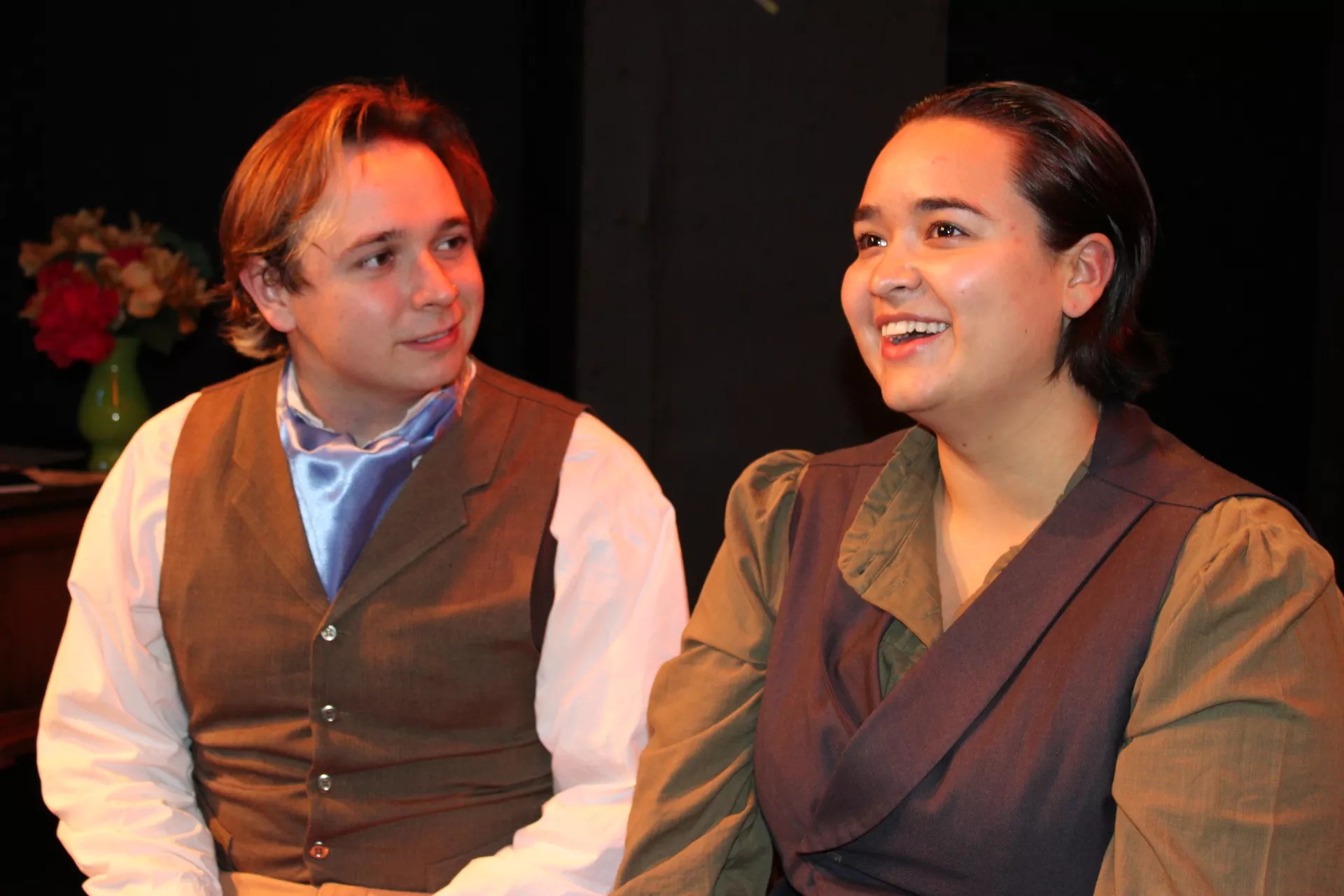
In this version of the story, both Jo and Laurie are struggling with their own gender expectations.
Courtesy of Toni Tresca
Jo’s journey, marked by her refusal to accept a constrained existence, echoes contemporary struggles for self-expression. The adaptation’s focus on gender goes beyond Jo: Laurie, the Marches’ neighbor turned friend, here played by Sam Evins, struggles with his own gender expectations.
“When I saw the initial casting call,” Evins recalls, “Kate described Laurie as somebody who doesn’t fit into regular gender norms, and I was like, ‘Can I play that role?’ When that idea was brought to it, I was really excited about it because I’m experiencing my own gender queerness.”
This new vision of Laurie deepens the character’s bond with Jo, as both resist societal pressures in different ways. Hamill’s approach also sheds new light on Amy March, often maligned in traditional retellings. Sophia Badia, who plays Amy, emphasizes the character’s complexity.
“Amy is this conglomerate of all of these other women in her life, and she’s trying to decide what path she wants to take,” Badia says. “For this version of Amy, because there is such a strong time jump in the play, the contrast has been heightened, so you see her go from spoiled, angry and volatile to her transition into womanhood and deciding who she wants to be and what that looks like – separate from her family, but also within her family.”
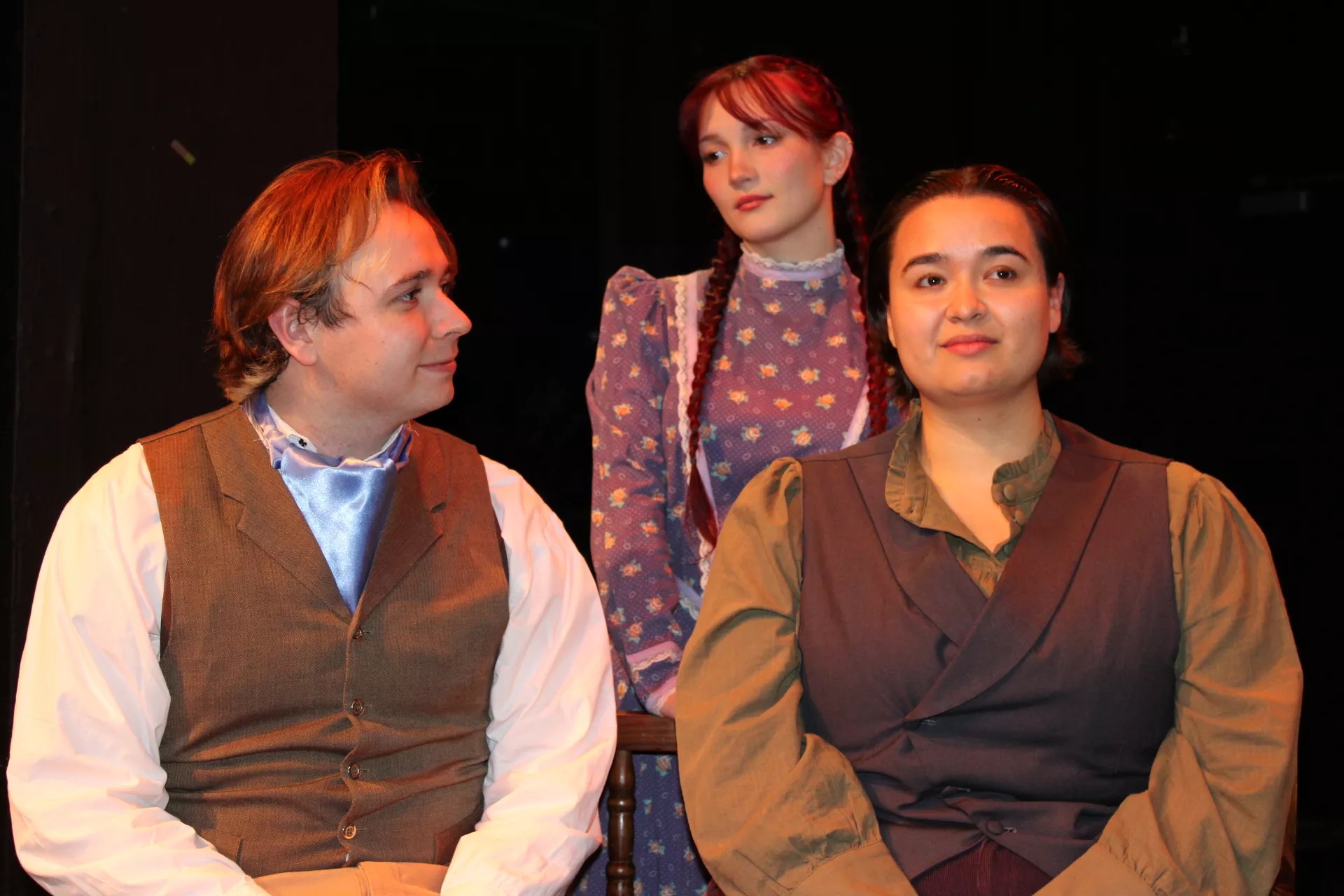
“Amy is this conglomerate of all of these other women in her life and she’s trying to decide what path she wants to go,” says actor Sophia Badia who plays the character.
Courtesy of Toni Tresca
Amy and Jo are two sides of the same coin in Hamill’s version of the story, as they are both determined, passionate and fiercely independent; however, they choose different paths. “Amy chooses to be strong-willed, stand her ground and live within the system,” Coldiron explains, “whereas Jo says, ‘I choose to be strong-willed, stand my ground and exist outside of it.’ Jo doesn’t want to be a woman in society and Amy does – I don’t think either is right or wrong.”
The production design mirrors Hamill’s blend of period authenticity and contemporary energy. Poling and her creative team designed a set to represent Jo’s journey as a storyteller, complete with an open book painted on the floor and pages flying out from a steepled roof.
“There’ll be a desk in the corner that will be Jo’s desk – which is sort of outside of the world of the play – where she goes to write the story into existence during the scene transitions,” Poling says. Costumes and set pieces seamlessly transition between scenes, underscoring the play’s fluidity and theatricality. Actors don base costumes with additional pieces layered for different roles, maintaining Hamill’s signature mayhem while allowing for quick, transformative shifts.
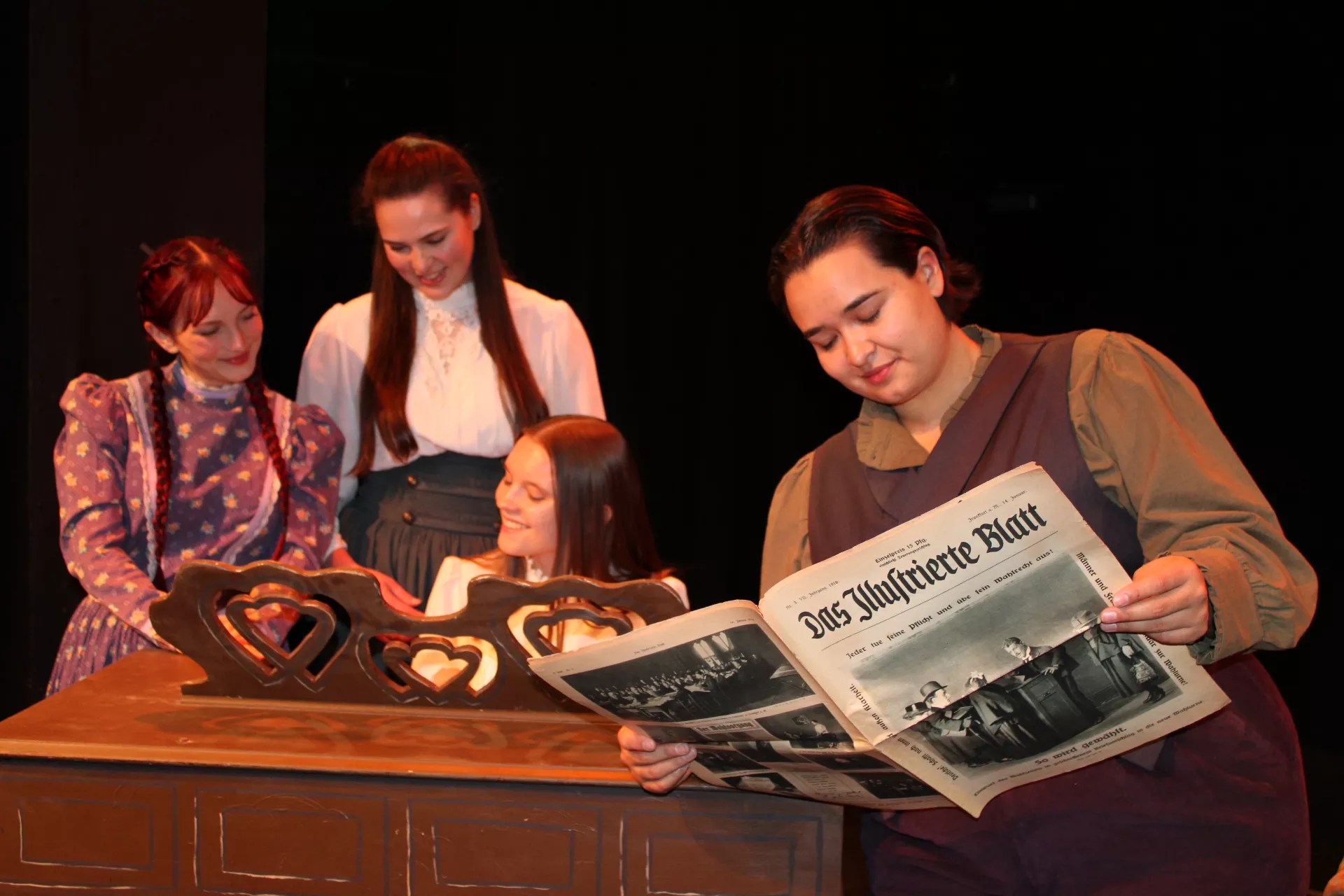
Little Women runs November 23 through December 22 at Denver’s Firehouse Theater Company.
Courtesy of Toni Tresca
The production strikes an equal balance of humor and introspection. “Of course, it has Kate Hamill’s signature female-forward themes, and we’re seeing the story through a more modern lens,” Poling says. “Jo and Laurie are not happy with their assigned roles, so she explores that as well as how they fight against it, bond over it and, ultimately, how they fit into a society where they’re not quite the gender norm that exists.”
While the production does not overtly tie itself to political commentary, the themes of resilience, identity and hope are unmistakable. “It’s really cool to get to see yourself in a piece of writing that’s set in the Civil War,” says Badia. “There’s power in showing that queerness has always been here and that no matter how hard people try to shove it down, we’re going to persevere. Even if we’re not directly making a commentary on this election, it’s there. There’s a feeling in the play that queer people have always been here, we will continue to be here, and we deserve to be here.”
Rather than seeking to preach or divide, Little Women offers a reminder that the fight for self-expression is timeless – and worth every struggle.
“We’re not explicitly putting those ties to the election in the show, but it’s definitely there, and you’re going to see them thematically,” Poling adds. “What we see in the show is sisters trying to fit into society and Jo and Laurie not conforming to traditional gender standards, but what is great about this show is that you also get to see the love and acceptance of those things. I think that’s also important given recent events – to still be able to see that there is still hope that exists, even if it’s in this play about the Civil War.”
Little Women, Saturday, November 23, through December 22, Firehouse Theater Company, John Hand Theater, 7653 East First Place, $20 to $32, firehousetheatercompany.com.